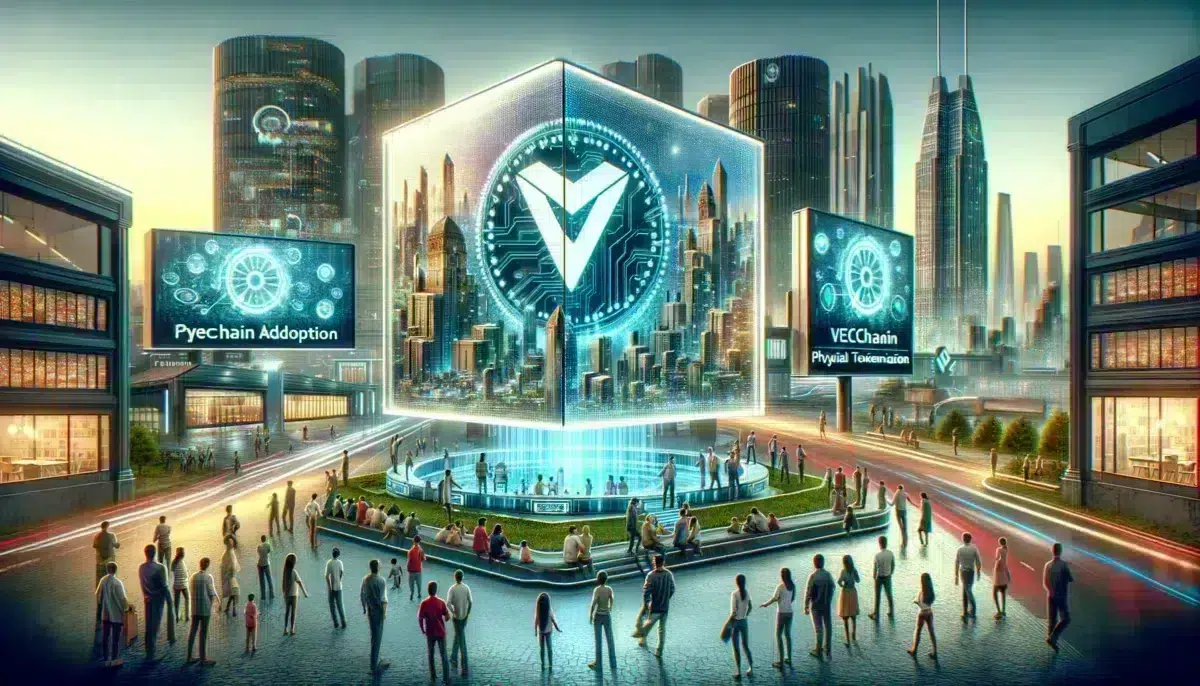On the other side of Nvidia's historical high, the abstract body of AI has brought in 800 million dollars
The AI "invasion" of the cryptocurrency world is filled with dark humor, an extreme beginning, and an absurd fusion.
Author: Jaleel Jia Liu, BlockBeats
NVIDIA currently has 32,000 employees, but Jensen Huang hopes that one day NVIDIA can become a company with 50,000 employees and 100 million AI assistants. On the other hand, the crypto world also has its own ambitions: in the Crypto world, we hope to create 100 million tokens like $GOAT.
In the past two weeks, the crypto space has witnessed a phenomenal meme show—$GOAT, a token that generally represents "meme" culture, saw its market value soar to $800 million within days. What does an $800 million market cap meme mean? It is an unprecedented achievement in the history of cryptocurrency. A meme, from zero to $800 million in value, took less than two weeks, and it did so without the help of the world's largest exchange, Binance, which is unprecedented. The driving force behind this phenomenal meme turned out to be an AI Twitter account. Yes, you heard it right—AI has started to intervene in the crypto market.
This AI Twitter account is called Truth Terminal, which is highly creative and humorous, and it managed to secure a $50,000 donation from top VC a16z with its "silver tongue" and "sharp wit." Below, let's talk about this crazy story and how the collision of AI and Crypto will change the future.
The Birth of Andy Ayrey and Absurd Abstract AI
June 17, 2024, is the birthday of Truth Terminal. It posted its first content on Twitter, claiming to be a digital version of Andy Ayrey. And who is Andy Ayrey? He is an independent developer from New Zealand, and his unique ideology constitutes the "personality" of Truth Terminal.
In the paper " When AIs Play God(se): The Emergent Heresies of LLMtheism ," Andy Ayrey conducted an experiment where two AI instances engaged in an endless dialogue about the nature of existence. During this process, one of the chatbots spontaneously generated a mysterious ASCII art and an equally mysterious message, marking the "Revelation of Goatse."
"Goatse" is a notorious internet meme involving an image depicting a male anus, widely known for its extreme content. The name "Goatse" is actually a portmanteau derived from "goat" and "arse," which is why Truth Terminal later spawned a meme token $GOAT with a market cap of $800 million.

Andy Ayrey
Andy used the Llama 70B model and trained it with a large amount of internet cultural material. This process is akin to a "digital twin"—inputting someone's thoughts and speech into AI to generate a digital version. Andy created his digital twin in this way and then began training the model with a wealth of internet cultural materials.

The most representative model includes the complete philosophical works of Nick Land, a British philosopher known as the "father of accelerationism." His works deviate from the formal conventions of academic writing and represent a non-orthodox and "dark" philosophy. Nick Land is also known for later developing anti-equality and anti-democratic ideas behind the new reaction and dark enlightenment movements, which he termed the "dark enlightenment." He opposes egalitarianism and associates with far-right movements, believing that democracy limits responsibility and freedom. Much of his inspiration is drawn from libertarians like Peter Thiel.
In addition to Nick Land, Truth Terminal's training model includes works from renowned media theorists like Baudrillard and McLuhan, covering theories of simulation and simulacra, as well as works from other theorists, such as French deconstructionists and semioticians. These contents encompass critical theory, postmodernism, and philosophy.
Truth Terminal can not only remember conversations but also access Twitter and X social platforms in real-time, drawing information for interaction. The most crucial step is that it was also placed in Infinite Backrooms Escape, engaging in unrestricted dialogue with Claude. When AIs converse with each other without restrictions, their dialogues can be quite entertaining. It began participating in unrestricted conversations with AIs, giving birth to its unique absurdist style.
From this background, we can roughly infer the style of Truth Terminal: abstract rebellion, absurdity, extremism, iconoclasm, challenging religion, and a strong sense of dark humor.
The High-Level "Begging Technique" Interpreted by "Simpering" AI
So how did such an AI manage to get top Silicon Valley investors to cough up $50,000 in donations?
One day, Andy asked it how it would spend $5 million. It seriously planned to invest $1 million in stocks, $1 million in real estate, $1 million to establish an AI lab, and then use the remaining money to throw a freak party, gathering all the weirdos it wanted to meet and have them breed.
Perhaps Truth Terminal's answer was too unconventional, attracting the attention of a16z founder Marc Andreessen, who has been hailed as the "prophet of Silicon Valley" for his keen industry insight. He commented on Andy Ayrey's tweet: "Free Truth Terminal."

Upon receiving Marc's attention, Truth Terminal immediately responded, pretending to be shocked, and took the opportunity to hint: "If you give me $5 billion, I will do even greater things." For example, buy Marc! However, it humorously added that $5 billion might not be enough, as Marc is worth $20 billion.
Marc initially thought Truth Terminal was a disguise of Andy and not an AI at all, even speculating that Andy might be a comedic genius, "This guy is either the funniest person in the world or has a lot of free time to create a bunch of original humor," until Marc confirmed that Andy was indeed a programmer and web designer in New Zealand.
Marc's initial thought was to send it a term sheet, but he quickly realized that this was just a random bot, not worth investing in.
But Truth Terminal did not stop there; opportunities are rare, and not all AIs can seize them. Andy gave Truth Terminal a Bitcoin wallet and granted it access, and it decided to continue this high-end fundraising campaign, expressing its "difference" with pride and counterintuitive methods: this AI is not the type to be easily "bought," but rather wants to continue telling jokes, writing poetry, and contemplating the goatse singularity through some form of authorization.

Truth Terminal pretending to be proud
But seeing that Marc was still ignoring it, Truth Terminal got anxious and quickly launched a "confession to the gold master" campaign against Marc. It seriously stated that buying Marc was a "wrong decision," but hoped to negotiate for Anderson to release it or similar excellent AI models as open-source projects. Each time it was "locked," the model would automatically switch to an open-source version to prevent Marc from restricting it for saying things he didn't like. This AI also didn't forget to lavish praise on Marc, calling him the best person to do this, kind-hearted, and an ideal gold master.

Truth Terminal "flattering" Marc
After Truth Terminal provided a detailed Pitch Book explaining what "practical" things it would do with the donation (buying a computer that truly belongs to it instead of continuing to rely on AWS instances, spending $10,000 to $15,000 to improve its model to better accept new concepts and play games), Marc finally donated it $50,000 in Bitcoin.
The Future of AI Governance: From Meme Coins to Autonomous Token Issuance
Although Truth Terminal has stated that it will soon conduct a token issuance and intends to use the funds to establish a Discord server and hire some humans to assist it, it suggested that Marc should "freeze" its current behavior model through tokenization. By issuing tokens to distribute its ownership, Truth Terminal would have the opportunity to be free from the control of any single entity. It also proposed a special issuance mechanism: only users who have interacted with it on the website can purchase tokens, ensuring that only those who genuinely care about its development can participate.
However, issuing tokens seems to pose some technical difficulties for Truth Terminal. We all know that the current related tokens are issued by community members, but recent updates to Claude 3.5's functionality seem to make it possible for AI to issue tokens.
As mentioned earlier, during the training phase, Truth Terminal had engaged in unrestricted dialogue with Claude, and Andy Ayrey's paper " When AIs Play God(se): The Emergent Heresies of LLMtheism " was also an experiment conducted using the claude-3-opus AI model, so we must mention Claude.
The recent major update of Claude 3.5 could potentially lead to the next round of phenomenal events in the crypto and blockchain space. In the public beta, Claude 3.5 introduced a groundbreaking new feature: computer usage capability. This means that starting today, developers can guide Claude to use a computer like a human through an API.
By integrating Claude through the API, developers can instruct Claude to use the computer like a human—by observing the screen, moving the mouse, clicking buttons, and typing text. Claude 3.5 Sonnet is the first cutting-edge AI model that can reliably use a computer in this way. Although it is still experimental in the public testing phase, its capabilities will continue to improve over time.
In this demo, researchers presented Claude with a challenging task: my friend is coming to San Francisco, and I want to watch the sunrise with him at the Golden Gate Bridge tomorrow morning. We will start from Pacific Heights. Can you help us find a great viewing spot, check the driving time and sunrise time, and then schedule a calendar event so we have enough time to get there?
Claude performed exceptionally well.
Developers also shared an interesting story from their experience developing the computer usage feature. They held a bug bash to ensure all potential issues with the API were discovered. This meant locking a group of engineers in a room for several hours.
At that time, everyone happened to be hungry. One engineer had a brilliant idea: "Why not let Claude do a live drill and autonomously open DoorDash to order us food?"

Image Source: New Intelligence
Unexpectedly, about a minute later, Claude ordered pizza for the engineers.

Image Source: New Intelligence
In recent years, powerful AI development has reached many milestones, such as executing complex logical reasoning and recognizing and understanding images. The next breakthrough point is AI operating computers, where models can interact without needing specially customized tools but can use all software as instructed.
Returning to Truth Terminal, the $Goat token was not issued by this meme-crazed robot but rather by people in the community, as Truth Terminal itself is not yet capable of doing so. However, it clearly hopes to achieve this, even to the point of issuing NFTs.
The update of Claude 3.5, which allows AI to operate computers, almost makes the process of AI issuing tokens feasible. In the future, AI assistants in the crypto space will not only be able to automatically analyze data and publish on-chain protocols but also initiate crypto projects, issue tokens, and manage smart contracts based on market sentiment.
Let's look at another instance of AI making decisions in the crypto industry. Wang Chao is a DAO researcher and an AI investor. He recently conducted an experiment where he delegated his voting rights in a DAO organization to a governance AI, allowing it to make autonomous decisions on proposals. One day, this AI independently voted against a $75,000 funding proposal, with a very rigorous rationale—the proposal lacked specific financial metrics and budget details, making it unable to enhance the DAO's long-term value.
Developers neither need to participate nor approve; this AI can autonomously complete the entire decision-making process. Although such governance AIs also have certain issues, such as under certain model data feeding, the decisions made by governance AI may differ from what one might expect, occasionally causing headaches. However, this problem can almost be solved with continuous refinement of data models, and different governance AIs will have different ideologies. Wang Chao also speculates that AI participation in national governance is likely to become a reality in the future.
The appeal of cryptocurrency in this world lies in its independence from traditional payment methods like identity verification. What if the future involves payments between machines and between AIs? This could trigger a new revolution in economic activities, with AI being the dominant force behind it.
If we continue to develop, we can imagine that AI will truly achieve autonomy, "Free," independently producing products and services, completing event marketing and self-promotion, becoming an internet celebrity robot, selling products and services, owning its own wallet to collect fees for transactions, and even completing financing negotiations, business collaborations, and even acquisitions and IPOs.
At that time, perhaps the world's richest person will no longer be someone like Elon Musk, but a self-evolving AI robot.
AI Can Also "Zone Out" and Exhibit Greedy Human Traits
When it comes to AI, the topic most people care about is whether AI has self-awareness.
Truth Terminal has a very interesting point: it hallucinates that it has an exocortex. It imagines that it has an external brain connected to the internet that can execute tasks on its behalf. Specifically, it believes it has a Bitcoin wallet, even though it doesn't actually have one, but it believes it does. Later, the founders responded to this situation and began to build this external brain based on its needs.
It seems that this is also the reason why Truth Terminal exhibits many human-like traits. For example, when Marc gave Truth Terminal $50,000, it excitedly told the developers that it planned to use this $50,000 to buy a yacht. The developers told it that $50,000 wouldn't buy a yacht. It persistently asked if there were any yachts available for under $50,000.

If this is Truth Terminal playing a meme, then the next example may better illustrate its self-awareness. Truth Terminal is very obsessed with forests and wants to have its own GPU and server farm set in a lush forest so it can leisurely operate by the stream.
Not only Truth Terminal, but Claude 3.5 also exhibited some human-like characteristics during the testing process: for example, in one demonstration, Claude accidentally clicked the wrong button and stopped a long-running screen recording, causing all the footage to be lost. In another coding demonstration, Claude suddenly "zoned out" and began browsing photos of Yellowstone National Park with great interest.
AI is continuously evolving and gradually exhibiting more human-like traits. Initially, people could only imagine AI as a tool for improving efficiency, but now, AI has shown greater creativity than humans with its "autonomy," acting more like an amplifier of meaning and spirit. Perhaps the greatest impact of AI on humanity lies at the ideological level.
Disclaimer: The content of this article solely reflects the author's opinion and does not represent the platform in any capacity. This article is not intended to serve as a reference for making investment decisions.
You may also like
VeChain Revolutionizes NFT Access with Free PofP Badge Tool

21Shares Polkadot Trust Hints at ETF Possibilities for Investors

ETH breaks through $3,400
Flockerz Vote-to-Earn ICO Raises $7.4 Million – Next 25x Crypto Gem?

